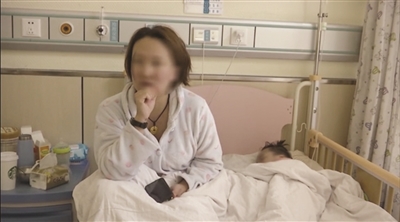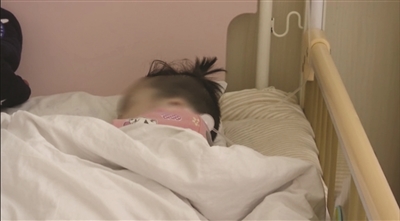Changzhou 3-year-old baby is allergic to rice. Doctor: It may be relieved when he grows up.


"Beef and mutton can’t be eaten, pork fat can’t be eaten, meat oil can’t be eaten, don’t mention seafood, fish, shrimp and shellfish, even tomatoes can’t be eaten! Like floss, as long as you eat your mouth, you will get edema, and your whole face will get eczema and lumps. " A baby under three years old in Changzhou has so many allergens that he is allergic to rice. He can only eat noodles, milk and a small amount of chicken breast or lean meat every day. Parents such as fruits and vegetables dare not feed their babies casually, for fear that they will be allergic when they eat them. It is really miserable.
Correspondent Sun Zhenjiang Liu Yuyun Yangzi Evening News/Yangyan reporter Zhang Bin
Drug allergy is severe, and food allergy is also exaggerated.
Not long ago, Lele, a baby under three years old in Changzhou, was admitted to Yanghu Hospital of Changzhou Second People’s Hospital because of pneumonia caused by respiratory infection. Speaking of Lele, his mother was worried sick. Many hospitals are afraid to treat Lele, because there are too many allergens, severe drug allergies and amazing food allergies.
"After we admitted Lele, we found that many antibiotics such as cephalosporin and penicillin for the treatment of respiratory infections could not be used. Some antibiotics can be used at first, but they can’t be used after a few days! Therefore, pneumonia is also very difficult to treat, and doctors have tried many ways to cure him. " Huang Zhiying, deputy chief physician of the Pediatrics Department of Changzhou Second Hospital, told the reporter that in addition to the severe drug allergy, Lele’s food allergy is also exaggerated, and rice, fruits and vegetables, meat oil, fish and shrimp, seafood, beef and mutton cannot be eaten. Basically, every day is milk, noodles and some chicken breast. Only dare to eat chicken breast among chicken, even dare not let Lele eat chicken leg meat, for fear that meat oil will make Lele allergic.
"It’s better to say what can be eaten faster than what can’t be eaten!" Lele’s mother said with a wry smile that this is not the first time Lele has been hospitalized because of allergies. According to Lele’s mother, they found that the child was allergic when he started eating complementary food at the age of 6 months. At that time, rice flour was added to the complementary food, and within an hour, he would have diarrhea, and then he kept pulling blood in his stool. "At that time, we were all scared! At first, I thought it was lactose intolerance. Later, after examination, I realized that Lele was allergic to rice! "
Knowing that Lele was allergic to rice, my mother thought it was not a particularly serious problem at first, and thought it would be good not to give him rice products in the future. But parents never expected that this was just the beginning of food allergy. As children grow up and come into contact with more and more kinds of food, parents find that Lele can’t eat more and more things! "You can’t eat too much meat, even tomatoes!" Lele’s mother said that the baby’s allergen is very strange. He can eat boiled lean meat, but he can’t eat pork floss, which is also a refined pork product. As long as the pork floss is eaten, it will become edema and eczema and lumps will appear on his whole face.
Not only parents are anxious, but also doctors have a headache.
"We have treated many children with food allergies, but most of them are sensitive to a relatively single variety. For example, allergies to protein, peanut nuts or seafood and shellfish are very common. It’s really the first time I’ve been a doctor for so many years like Lele! " Huang Zhiying told Yangzi Evening News that children’s food allergy is a common pathological reaction of human body to edible antigen. Food allergy usually causes itching, urticaria and various respiratory or intestinal problems within a few minutes to 2 hours after eating. But like Lele, there are so many drug allergens and so many food allergens that it is the first time for her to see them. In this case, Lele is not only a headache for parents, but also for doctors. "We all suggest that children should carry an adrenaline pen with them in the future to avoid accidents when anaphylactic shock occurs."
It is understood that allergic diseases are one of the most common chronic diseases in the world. Food allergy refers to the abnormal immune response to food after it enters the human body, which leads to the disorder of physiological function or tissue damage, and then leads to a series of clinical symptoms. Common food allergens are: milk, eggs, peanuts, soybeans, wheat, nuts, fish, shrimp, crabs, shellfish and so on. The prevalence of food allergy in children is higher than that in adults because of poor gastrointestinal barrier, low activity of some digestive enzymes, low gastric acidity and immature immune system. Allergic diseases have a natural course, and some infants’ allergies can improve themselves after 3-6 years old. The most common route of food allergy is ingestion, but there are also food allergies caused by contact and inhalation. The clinical manifestations of food allergy include oral symptoms (swelling of lips, etc.), respiratory symptoms (dyspnea, etc.), digestive tract symptoms (diarrhea, bloody stool, etc.), and skin symptoms (eczema, dermatitis, etc.).
It is related to heredity, constitution, etc., and may be relieved when you grow up.
At present, there is no oral desensitization treatment for food allergy in China. Therefore, patients with definite allergic food should abstain from this food and all foods containing this food ingredient.
Dr. Huang Zhiying told the Yangzi Evening News reporter that food allergies have a certain relationship with family inheritance and children’s physique. Food allergy is not contagious, but it has a certain genetic tendency. If you have a family history of allergies, you should start to prevent children from allergies from pregnancy. Like Lele’s sister, there are many food allergens, but not as serious as Lele.
According to statistics, about 10% people will have food allergies, among which children are more prone to allergic reactions because the digestive tract and immune system are still developing. Doctors remind that severe food allergies may cause dyspnea, anaphylactic shock and other symptoms. Once you find allergies, you should seek medical advice in time, confirm the foods that cause allergic reactions, and try to avoid contact again. In addition, some childhood allergies will gradually ease with age, so parents don’t have to worry too much.
These allergies are also rare.
A one-and-a-half-year-old girl is allergic to water.
I can’t even cry and sweat.
It is almost inevitable for children to cry, sweat and take a bath every day. However, Ivy Angermann, an 18-month-old girl in Minnesota, USA, must try to avoid all this. The reason is that she will be allergic to water.
Tears, sweating and bathing will make her skin red, swollen and painful. Allergic symptoms of little girls are very rare. The British Metropolis Daily reported that there are only about 50 such cases in the world.
At first, Mr. and Mrs. Angermann found that the baby’s skin would be swollen and blistered as soon as he took a bath. They thought there was something wrong with the bath lotion, so they changed many brands of bath products, but the problem still existed, and then changed the water, and the situation was still the same.
In October 2017, Ivy was diagnosed as allergic to water and could not take a bath, play with water, swim, get wet in the rain, shed tears or sweat. But for such a young child, crying is common. Ivy’s mother, britta Ni, said, "I had to teach her not to cry, to hide her tears or to express her emotions in another way, but it was so difficult that it broke my heart."
The couple can only bathe Ivy once a week now. It’s like taking a bath with bleach. You can’t dry it with a towel after washing, because it will break the blisters and you can only wait for it to dry naturally. Ivy will also take drugs to reduce allergic reactions.
Britta Ni is also worried that what should Ivy do if she is splashed with water by her classmates after school? What should I do if I am sad because of my illness? What is even more worrying is: I don’t know how to develop my illness in the future. Will it get so serious that I can’t drink water? She said: "Life is hard for the whole family, but we live in the present every day and think about what is best for Ivy."
Boys are allergic to the sun
Going out to dress is like an astronaut.
According to the Daily Mail, last year in California, a 7-year-old boy named Oliver Kay was allergic to the sun because of a rare genetic disease. Every time he went out, he needed to wear complicated anti-ultraviolet safety equipment.
Oliver was diagnosed with xeroderma pigmentosum when he was 18 months old. The probability of this disease is nearly one in a million, which means that his skin can’t repair the damage caused by sunlight and other ultraviolet rays.
Oliver’s risk of skin cancer is 1000 times that of ordinary people, so his family must take extreme measures to protect him. His mother sewed a layer of anti-ultraviolet fabric on Oliver’s clothes and wrapped him with a thick plastic sun visor and anti-ultraviolet gloves. This equipment made him look like an astronaut. The mother applies strong sunscreen to her son every few hours, and their homes and car windows are equipped with ultraviolet protective films.
Although taking care of Oliver’s daily life makes his family exhausted, his family still looks forward to getting rid of the restrictive equipment and playing happily outdoors with his three brothers and sisters in a few hours after sunset. People around him affectionately call him "the son of the moon".
Oliver suffers from chronic esophagitis, esophagitis and gastroparesis at the same time, which makes him unable to participate in outdoor activities.
This fatal disease didn’t stop Oliver from becoming a happy child. He also had his own hobbies, jazz and ballet.
Such strict protection measures still can’t prevent Oliver’s skin from turning black and growing too many freckles, so his mother decided to take Oliver to start stem cell therapy. (comprehensive beiqing)